Click on images for the articles
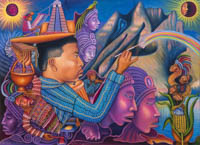 |
|
This exhibition consists of 43 paintings from
the Helen Moran and the Arte Maya Tz'utujil Collections. The texts explain the significance of these paintings in terms of Maya Spiritual beliefs.
For each painting there is a text of 100 words of less, and
also a longer text that goes into depth.
This exhibition
is available for your museum or cultural center
For more information email: Joseph at artemaya dot com.
|
|
 |
By Benjamin D. Paul
Benjamin Paul, who later became the head of Stanford University's cultural anthropology department, describes the
customs of the Maya of San Pedro la Laguna. Although many things have changed since the article was written in 1950,
it still provides a deep and very human understanding of the people of this Tz'utujil Maya town.
|
|
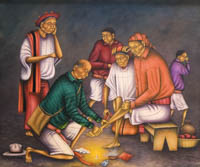 |
By Benjamin D. Paul
San Pedro la Laguna is famous throughout Guatemala for its curanderos de huesos, Maya bonesetters.
This short article, written in 1976, describes the process of becoming a curandero.
|
|
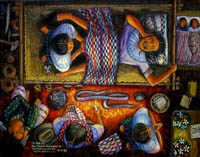 |
Lois Paul
In 1978 anthropologist Lois Paul, Benjamin Paul's wife, published this article about midwives in San Pedro la
Laguna. One of the midwives in this article, Juana, is the subject of Barbara Rogoff's award winning 2011 book Developing
Destinies: A Mayan Midwife and Town.
|
|
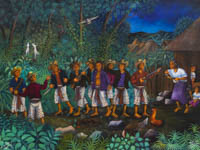 |
By Benjamin D. Paul & William Demarest
In the conflict between the Guatemala military and guerrilla fighters, the worst violence in Guatemala occurred between
1980 and 1985. It manifested in different ways in different Maya towns. This article describes how it happened in San Pedro la Laguna.
|
|
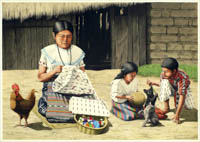 |
By Benjamin D. Paul
This article about sibling rivalry, written in 1950, captures many aspects of life in San Pedro la Laguna.
At that time San Pedro was a small isolated village. Many beliefs and customs have changed or disappeared since then.
|
|



































